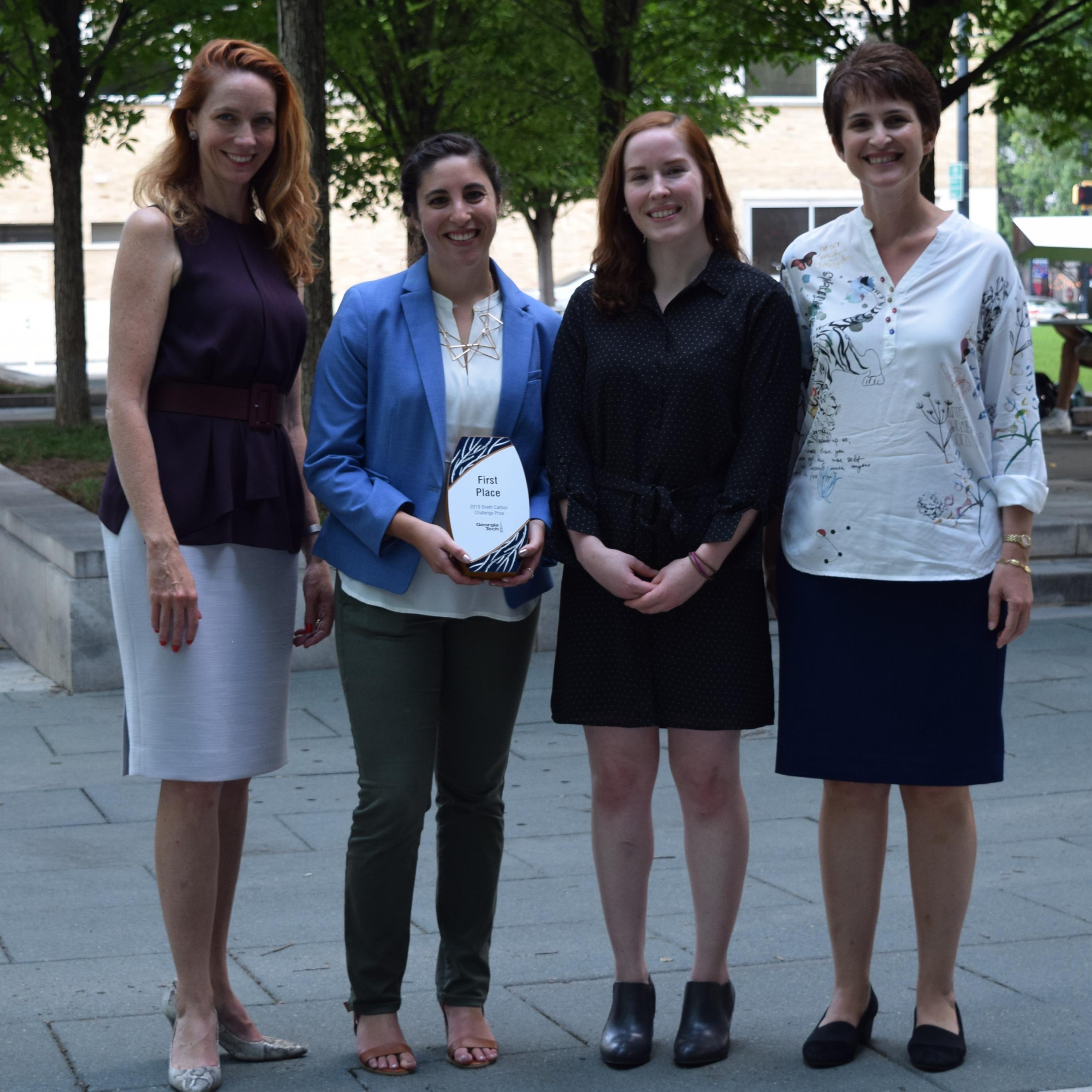Editors Note: This story is an abridged version of an article by Kelsey Abernathy and Selena Perrin published originally on Aug. 29, 2019, by the Scheller College of Business. A different headline was set for the College of Sciences audience.
How do you stop millions of pounds of heat-trapping CO2 from ever being emitted? In Georgia Tech’s Summer 2019 Carbon Reduction Challenge, student interns used their ingenuity to identify opportunities for scalable carbon reduction projects at a wide variety of partnering organizations. In doing so, they delivered large energy and cost savings to their employers.
Over the 10-week challenge, the students benefited from frequent coaching sessions led by faculty co-directors Kim Cobb, Director of the Global Change Program and professor in the School of Earth and Atmospheric Sciences, and Beril Toktay, Director of the Ray C. Anderson Center for Sustainable Business and professor in the Scheller College of Business.
Now in its third year, the internship-based Challenge has resulted in a total of over 30 million pounds of avoided CO2 emissions while delivering hundreds of thousands of dollars in avoided energy costs to partner organizations. In this year’s Challenge, 45 students from Georgia Tech, Agnes Scott College, Clemson University, Emory University, Georgia State University, and the University of Georgia competed for prizes provided by the Sheth Foundation.
On August 13, students presented their Summer 2019 projects to the general public and key industry leaders at the Challenge’s Summer Poster Expo at the Georgia Tech Scheller College of Business. Partnering organizations included Agnes Scott College, AT&T, Boeing, Emory University, Hartsfield-Jackson Atlanta International Airport, Jacobs Engineering, Michaud Cooley Erickson, and SunTrust Banks.
The top prize of $5,000 was awarded to Georgia Tech College of Sciences students Rebecca Guth-Metzler, Brooke Mancinelli-Rothschild, and Priyam Raut, who worked to implement a number of energy-saving initiatives in the Petit Institute for Bioengineering and Bioscience Building. Working with Georgia Tech Facilities, they replaced fluorescent light bulbs with LED bulbs and created a system for bundling energy-intensive autoclave loads. When fully implemented, their proposed changes will result in over 250,000 pounds of CO2 reductions per year.
“Our scientific research requires that we work in labs that are energy-intensive,” the team said. “We saw the Carbon Reduction Challenge as an opportunity to advocate for updates to our lab building and to lead the way toward more environmentally friendly lab practices.”
The second prize went to a team that developed a proactive plan to recycle aluminum in SunTrust signage that will need to be replaced as the company rebrands following its merger with BB&T. This project will save 1.2 million pounds of CO2 and generate a revenue of $125,000.
Two projects tied for third place. One is a project to upgrade dozens of outdoor lighting fixtures to LEDs at Michaud Cooley Erickson in Minneapolis, Minnesota, which will save 62,000 pounds of CO2 and $5,500 per year. The other project was a proposal for a more efficient lighting schedule for sprawling buildings at the Boeing campus in Seattle, Washington, which will translate to a savings of 6 million pounds of CO2 and $700,000 per year. Honorable mentions were awarded to projects with Agnes Scott College, Jacobs Engineering, and SunTrust Banks.
Student interns’ innovative work at the Poster Expo illustrated that employees do not need to have “sustainability” in their job title in order to be successful climate champions at work. “The Carbon Reduction Challenge is a particularly innovative real-world learning opportunity,” said Andrea Pinabell, President of Southface Institute, who served as a judge. “It equips students for success in an era of increasing interest in sustainable and climate-driven solutions.”
Top Three Teams
First Place ($5000)
Georgia Tech Labs Project
Rebecca Guth-Metzler (Biochemistry, second-year PhD student)
Brooke Mancinelli-Rothschiled (Biochemistry, second-year PhD student)
Priyam Raut (Bioinformatics, MS ’20)
Second Place ($3000)
SunTrust Banks Project
Nicholas Loprinzo (Industrial and Systems Engineering, BS ’20)
Raina Parikh (double major: Business Administration, International Affairs and Modern Languages; BS ’21)
Sarah Poersch (Business Administration, BS ’19)
Hongyangyang Shi (Analytics, MS ’19)
Athara Vaidya (Georgia State University, Analytics, MS ’19)
Third Place (tie, $1000 each)
Boeing Project
Kian Halim (Earth and Atmospheric Sciences, BS ’21)
Louis Hou (Business Administration, BS ’20)
Sam Shapiro (Computer Science, BS ’20)
Chris Wink (Business Administration, BS ’20)
Michaud Cooley Erickson Project
Nic Fite (Electrical Engineering, BS ’22)



